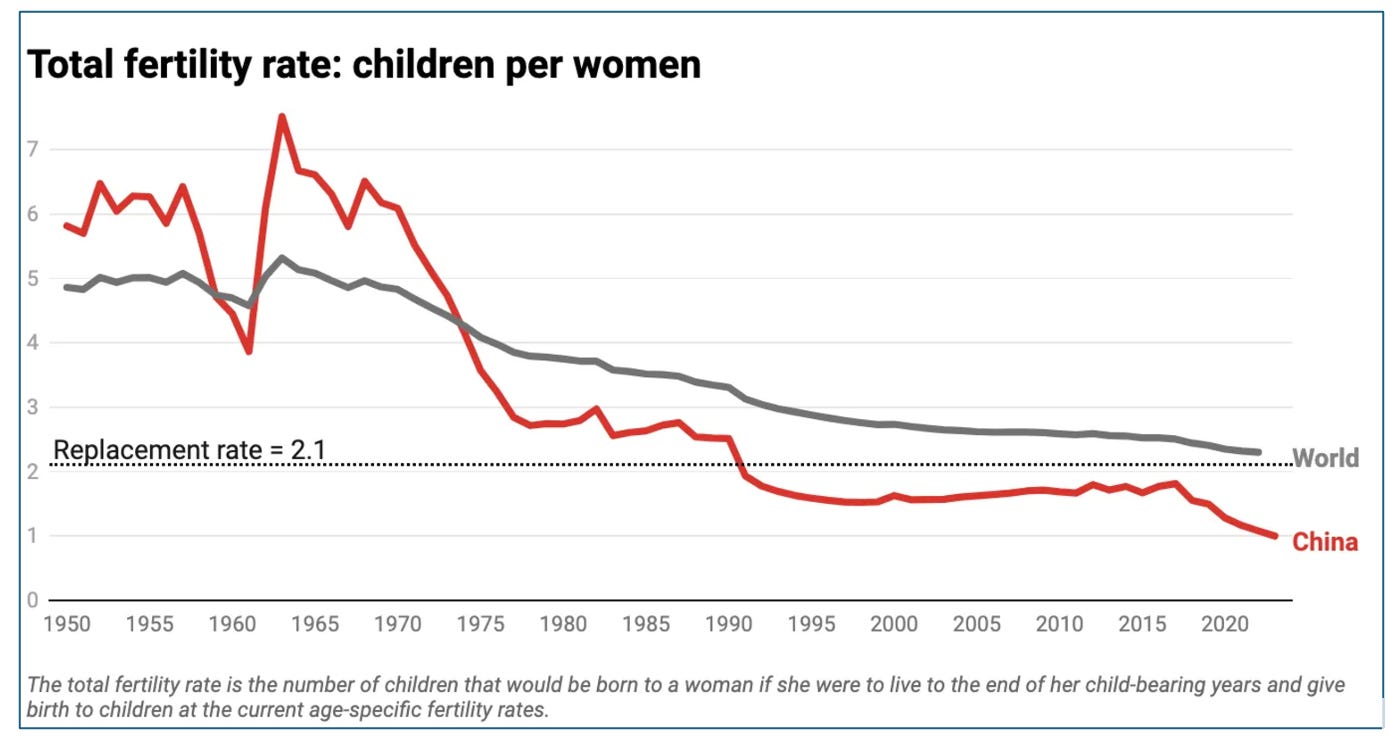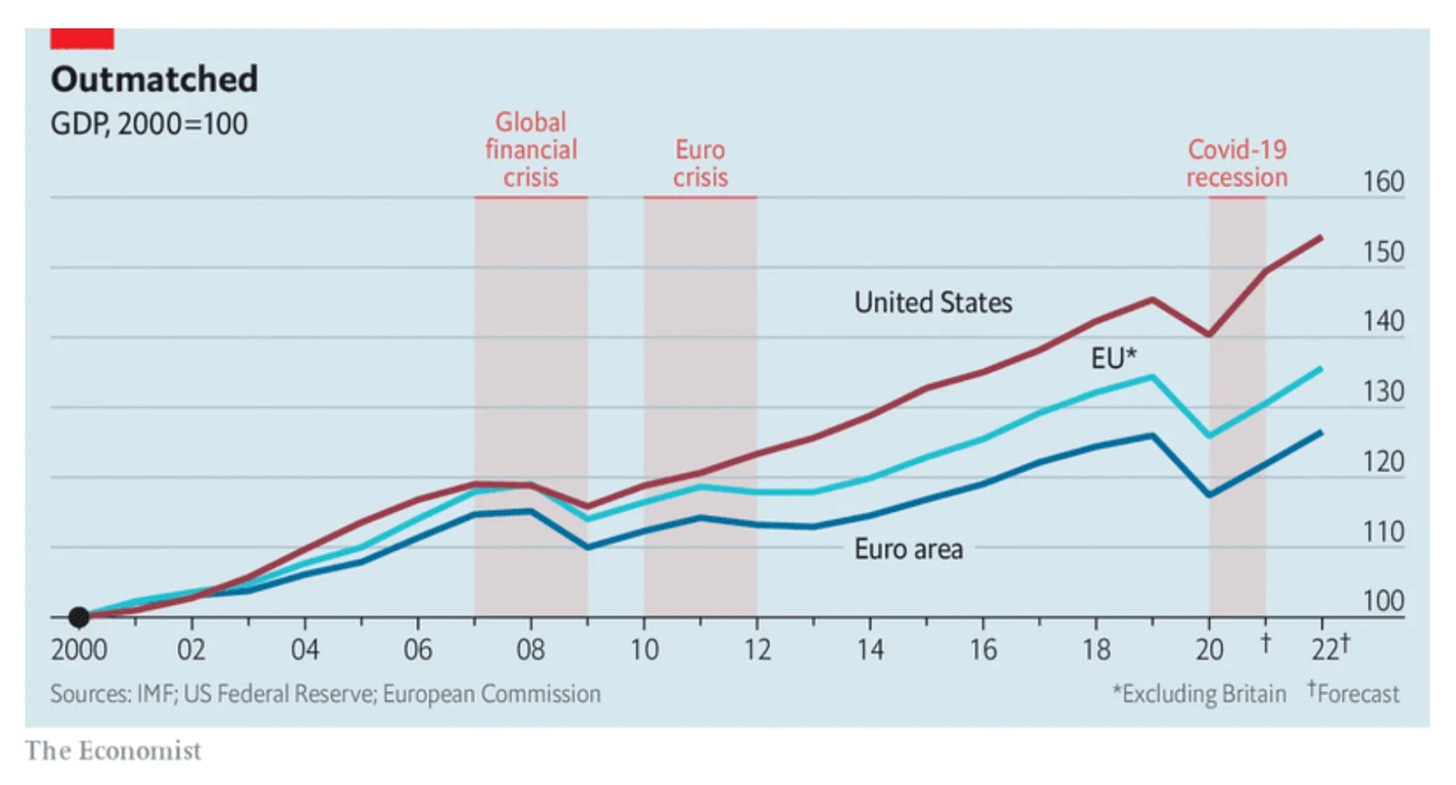How China is Reinventing the Economy
Why Xi Jinping's "New Quality Productive Forces" could be a turning point in world history
Hello and welcome back to What China Wants.
While the Western press is busily debating the ups and downs of the impending Trump presidency, there is almost no coverage of the immense, never-before-seen changes that Xi Jinping is trying to achieve in China. And there should be, because if Xi Jinping’s vision for a new future becomes reality, it will see the potential upending of the very fabric of the way economies work - and not just in China.
It’s well known that China has a demographic problem. What perhaps isn’t is the scale of it. The latest prediction by the well-respected Shanghai Academy of Social Sciences suggests that China’s population will fall between now and the year 2100 from 1.4 billion today to just 525 million. That’s a 60% drop, an unheard-of level of depopulation in a large country. (And no, this is not because of the One Child policy – the fertility rate had already collapsed in the ten years before the policy was announced in 1979; what One Child rules did lead to was massive female infanticide, which means there are an estimated 30-40 million men in China who will never find a wife. That’s more single men today than there are men in the US between the ages of 20 and 60.)
This population collapse will be a colossal economic shock to China. Its rise as an economic and manufacturing superpower was powered by masses of cheap labour. Although rising labour costs have already made China uncompetitive in lower-grade manufacturing, it is going to have to find a radical solution overall when its workforce sinks from 740 million today to just 210 million at the end of this century.

This looming disaster will fall on a Chinese economy that is already suffering. An ongoing property crisis, chronic deflation, decreased consumer confidence, and sluggish manufacturing, are just some of the headwinds constraining growth. As economic security is a major pillar of political stability – a key requirement of the Chinese Communist Party (CCP) – this is not a situation that Beijing will want to ignore in the long run.
The second element at play concerns the Fourth Industrial Revolution (4IR). This is a term used to describe the way that technology is bringing about significant change to industry, for example the development of industrial digital platforms and new advanced manufacturing techniques. It is, according to the World Economic Forum, “a new chapter in human development, enabled by extraordinary technology advances”.
The CCP has stated that winning the race to be the leader in the 4IR is geopolitically imperative. As we state in the China AI paper I co-wrote with Di Cooke and William Matthews, this would “put China at the forefront of technological and economic development while countering perceived US leverage of its own current leadership in AI as a means of restricting China’s growth”. In sum, “China wishes to accomplish a transformation on the order of what the United Kingdom achieved with steam power, Germany and the United States with electricity, and the United States again with computers”.
What these two issues – demographic challenge and winning the 4IR race – have in common is that Beijing hopes that the use of these emerging technologies will serve to negate the effects of population decline and other economic challenges.
We have long known that technological leadership has been important to the CCP, not least because of the focus on tech in each consecutive Five Year Plans. What was a surprise to many was just how far Beijing wants to take this tech. In September 2023 Xi Jinping announced the launch of New Quality Productive Forces ( 新质生产力) (or “NQPF”). The basic premise of NQPF is to "advanced productivity that plays a leading role in innovation and breaks away from the traditional economic growth mode and productivity development path". In other words, a focus on technological advancement, rather than traditional productive forces that rely on basic resources such as land and labour.
This may sound like pie in the sky for some. Breaking free from the productive forces of land and labour – which has underpinned economic growth since the dawn of time – sounds impossible. But Xi is taking it seriously. He mentioned it more than twenty times between September 2023 and March 2024, and he told a military assembly that “regarded developing new quality productive forces as one of the political goals for his current third term as China’s president and as head of the party and the military”. He is also putting money where his mouth is; as The Economist notes, the central government’s budget, released in March this year, increased annual spending on science and technology by 10%, the largest percentage increase of any division.
China is already putting vast amounts of money into tech R&D. Aiming to be a global innovation power by the middle of this century, by 2020 it was reported to be spending almost 2.9 trillion yuan ($420 billion, or 2.8% of GDP) on science and technology. This is not just government spending, but a whole of nation effort, including the private sector.
This spend is paying dividends. China is now a technological leader is sector after sector, from drones to 5G/6G to robotics to sonar. In the 2024 Nature Index - a database that tracks institutions and countries and their scientific output – eight of the top ten universities were Chinese.
NQPF will thus be an extension – an acceleration – of what is already happening. But what would NQPF actually lead to? Even just looking at AI, the ambition is enormous, with plans to transform the economy through increased efficiency and upgrading traditional industry; to improving the efficiency and capacity of social governance, ranging from administration to surveillance to social morality; and to improve the coverage and quality of provision of key social services including healthcare, elder care, and law.
Fast forward two decades, China could be very different in terms of how its economy functions, and how it looks after its people. Assuming NQPF works, and is more efficient than the productive forces that underpin the world today, then the benefits of Xi’s vision will have been exported via commercial advantage for Chinese companies, and the copying of the new “Chinese model”. This in turn will entrench and further expand Beijing’s global influence, as well as making the country less susceptible to US pressure.
What are the countries of the West doing in response?
The US is already trying to restrict China’s growth, for example through export blacklists that it hopes will stymy its technological development. It is not clear if this is working, and indeed many in China would say (are saying) that they are able to push ahead despite Washington’s actions.
President Elect Trump – who kicked off the original US-China trade war back in 2018 – has already stated he will continue to attack China economically. He is also planning a whole host of changes to the US economic model: more tariffs, changes to the labour market by expelling illegal immigrants, and cutting huge amounts from the Federal budget. Even if these measures do not lead to the growth he wants, they will almost certainly lead to structural changes in the world economy.
Europe, including the UK, is way behind on all this. There is no discussion of a fundamental change to the continent’s economic model, no desire to reinvent itself. The UK’s new Labour government have recently announced a “plan for change”, but what is being discussed is low-key, tactical in nature, rather than addressing fundamental issues like how to rein in welfare and health budgets totally out of control.
For Europe, the big structural alterations that the US and China are proposing are nowhere to be found. We have already seen Europe’s growth completely outpaced by the US and China in recent years, especially since the Great Financial Crisis of 2008-09. If New Quality Productive Forces come true, and Trump’s new vision for America likewise, then Europe will fall even further behind. This will not be good either for domestic stability or international influence.
Xi Jinping is said to want to be the most important Chinese leader since Chairman Mao. If NQPF succeeds then he will not only succeed in China, but will rewrite the rules of the economy. Unless Europe, and possibly the United States, follow his lead then Xi will bring about and benefit from a global revolution far in excess of anything Mao could have dreamed of.
Thanks for reading - I’ll be back soon with more research.
Sam




